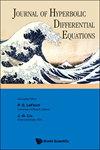Weakly stable hyperbolic boundary problems with large oscillatory coefficients: Simple cascades
IF 0.5
4区 数学
Q4 MATHEMATICS, APPLIED
引用次数: 2
Abstract
We prove energy estimates for exact solutions to a class of linear, weakly stable, first-order hyperbolic boundary problems with “large”, oscillatory, zeroth-order coefficients, that is, coefficients whose amplitude is large, [Formula: see text], compared to the wavelength of the oscillations, [Formula: see text]. The methods that have been used previously to prove useful energy estimates for weakly stable problems with oscillatory coefficients (e.g. simultaneous diagonalization of first-order and zeroth-order parts) all appear to fail in the presence of such large coefficients. We show that our estimates provide a way to “justify geometric optics”, that is, a way to decide whether or not approximate solutions, constructed for example by geometric optics, are close to the exact solutions on a time interval independent of [Formula: see text]. Systems of this general type arise in some classical problems of “strongly nonlinear geometric optics” coming from fluid mechanics. Special assumptions that we make here do not yet allow us to treat the latter problems, but we believe the present analysis will provide some guidance on how to attack more general cases.具有大振荡系数的弱稳定双曲边界问题:简单级联
我们证明了一类线性、弱稳定、一阶双曲型边界问题精确解的能量估计,该问题具有“大”、振荡的零阶系数,即振幅大的系数,[公式:见正文],与振荡的波长相比,[公式,见正文]。以前用于证明具有振荡系数的弱稳定问题的有用能量估计的方法(例如,一阶和零阶部分的同时对角化)在存在这种大系数的情况下似乎都失败了。我们证明,我们的估计提供了一种“证明几何光学”的方法,也就是说,一种决定近似解(例如由几何光学构建的近似解)是否在独立于[公式:见正文]的时间间隔上接近精确解的方法。这种一般类型的系统出现在来自流体力学的“强非线性几何光学”的一些经典问题中。我们在这里做出的特殊假设还不允许我们处理后一个问题,但我们相信,目前的分析将为如何处理更一般的情况提供一些指导。
本文章由计算机程序翻译,如有差异,请以英文原文为准。
求助全文
约1分钟内获得全文
求助全文
来源期刊

Journal of Hyperbolic Differential Equations
数学-物理:数学物理
CiteScore
1.10
自引率
0.00%
发文量
15
审稿时长
24 months
期刊介绍:
This journal publishes original research papers on nonlinear hyperbolic problems and related topics, of mathematical and/or physical interest. Specifically, it invites papers on the theory and numerical analysis of hyperbolic conservation laws and of hyperbolic partial differential equations arising in mathematical physics. The Journal welcomes contributions in:
Theory of nonlinear hyperbolic systems of conservation laws, addressing the issues of well-posedness and qualitative behavior of solutions, in one or several space dimensions.
Hyperbolic differential equations of mathematical physics, such as the Einstein equations of general relativity, Dirac equations, Maxwell equations, relativistic fluid models, etc.
Lorentzian geometry, particularly global geometric and causal theoretic aspects of spacetimes satisfying the Einstein equations.
Nonlinear hyperbolic systems arising in continuum physics such as: hyperbolic models of fluid dynamics, mixed models of transonic flows, etc.
General problems that are dominated (but not exclusively driven) by finite speed phenomena, such as dissipative and dispersive perturbations of hyperbolic systems, and models from statistical mechanics and other probabilistic models relevant to the derivation of fluid dynamical equations.
Convergence analysis of numerical methods for hyperbolic equations: finite difference schemes, finite volumes schemes, etc.
 求助内容:
求助内容: 应助结果提醒方式:
应助结果提醒方式:


